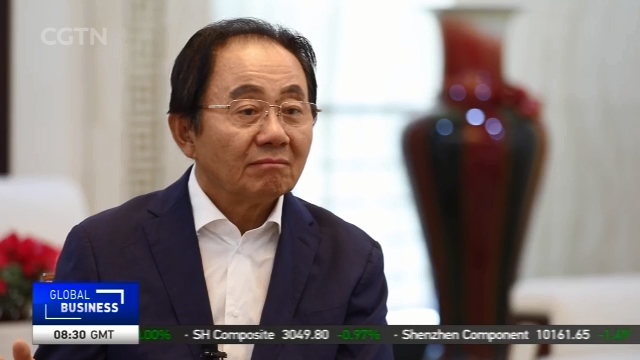
18:54, 13-Jun-2018
Preparing for Grid Parity: Zhongli diversifying into NEV batteries, agriculture
03:34

While many solar companies in China are lobbying for a rethink of the subsidy cut, one company started preparing for policy changes a few years ago--innovating in agriculture and car batteries. I spoke to Wang Baixing, chairman of Zhong Li Group about their strategic shift.
When the new policies came out, people went online to vent their anger. For example Japan announced tariff cuts seven years ago, 9% every year, now they're at about grid parity, without any back and forth. I think we need clearer industrial plans, we can't have policies changing every few months, it's hard on companies that have made big investments.
As to whether the future is about mono or poly panels, I don't think it's important. Grid parity is coming and we're prepared, especially in agriculture. Two years ago I asked the Energy Administration to give me quotas in central and eastern China, if we can get 3,000-5,000 yuan of annual revenues from solar plus farming, I don't need subsidies.
If you look at our pilot in Changshu, 10 megawatts of solar power from panels on top, at the bottom we grow rice, wheat, farm fish, and crabs. This is very innovative. Because our farmland is so scarce, usually you can't get land for solar power, so we used salt marshes and wasteland. In 2016, we brought out the impoverished villages' solar farms, with 4 metre high stands and ten metres apart, half a million megawatts per village. Later we spent 5 billion yuan to build 43 of these village solar farms, now the State Council's poverty alleviation authority has approved us for scaling up.
Having you thought about rolling this out to Belt and Road countries?
We're having a lot of interest from overseas. At the end of this year, our 300-megawatt project in Argentina will start generating electricity and go on-grid. Last October, Japan's NHK came to interview us, to ask how to promote solar plus agriculture around the world. We are doing some of that, like building a plant in Thailand with 800megawatts capacity, to fill in the gap in their solar energy sector, this is something their prime minister is very positive on, we're also replicating our agricultural success there.
You've said that 2018 is about diversifying to new energy, how acquisitions will help you in that strategy?
About our acquisition of BAK battery, it's still ongoing, we should get the legal and financial due diligence reports at the end of June, our stocks should resume trading by the end of July. These deals usually take four to five months, ours is sizeable, at around 10 billion yuan, that's what's taking so long. As for why I'm going into new energy vehicle batteries, even though the industry has had 80% excess capacity since three years ago, I think those in the top five for technology and scale are very much in demand because this industry has a very high entry barrier.

SITEMAP
Copyright © 2018 CGTN. Beijing ICP prepared NO.16065310-3
Copyright © 2018 CGTN. Beijing ICP prepared NO.16065310-3